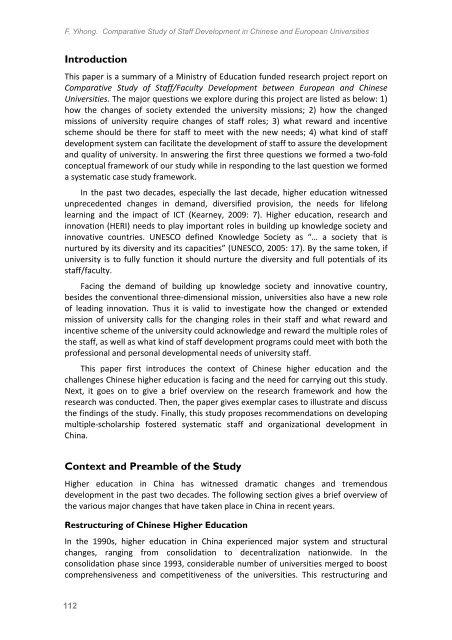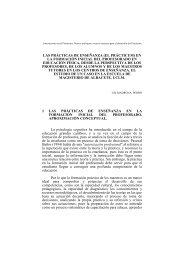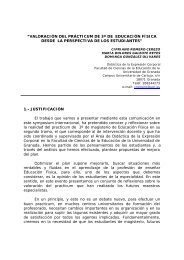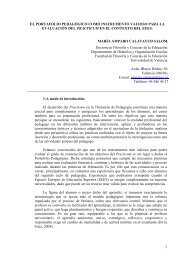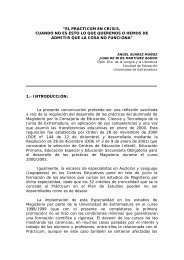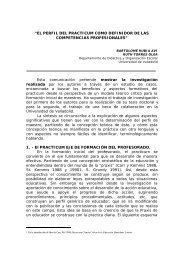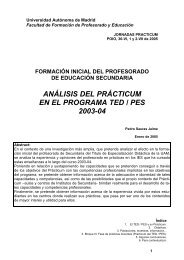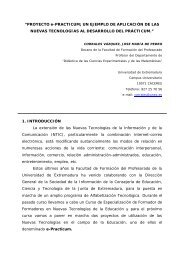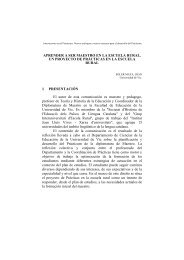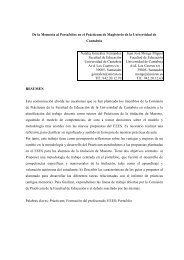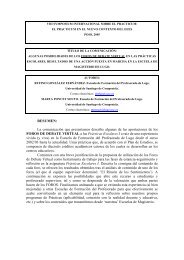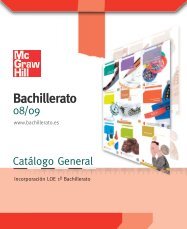descarga completa del vol. 9 nº 1 - REDU. Revista de Docencia ...
descarga completa del vol. 9 nº 1 - REDU. Revista de Docencia ...
descarga completa del vol. 9 nº 1 - REDU. Revista de Docencia ...
Create successful ePaper yourself
Turn your PDF publications into a flip-book with our unique Google optimized e-Paper software.
F. Yihong. Comparative Study of Staff Development in Chinese and European UniversitiesIntroductionThis paper is a summary of a Ministry of Education fun<strong>de</strong>d research project report onComparative Study of Staff/Faculty Development between European and ChineseUniversities. The major questions we explore during this project are listed as below: 1)how the changes of society exten<strong>de</strong>d the university missions; 2) how the changedmissions of university require changes of staff roles; 3) what reward and incentivescheme should be there for staff to meet with the new needs; 4) what kind of staff<strong>de</strong>velopment system can facilitate the <strong>de</strong>velopment of staff to assure the <strong>de</strong>velopmentand quality of university. In answering the first three questions we formed a two‐foldconceptual framework of our study while in responding to the last question we formeda systematic case study framework.In the past two <strong>de</strong>ca<strong>de</strong>s, especially the last <strong>de</strong>ca<strong>de</strong>, higher education witnessedunprece<strong>de</strong>nted changes in <strong>de</strong>mand, diversified provision, the needs for lifelonglearning and the impact of ICT (Kearney, 2009: 7). Higher education, research andinnovation (HERI) needs to play important roles in building up knowledge society andinnovative countries. UNESCO <strong>de</strong>fined Knowledge Society as “… a society that isnurtured by its diversity and its capacities” (UNESCO, 2005: 17). By the same token, ifuniversity is to fully function it should nurture the diversity and full potentials of itsstaff/faculty.Facing the <strong>de</strong>mand of building up knowledge society and innovative country,besi<strong>de</strong>s the conventional three‐dimensional mission, universities also have a new roleof leading innovation. Thus it is valid to investigate how the changed or exten<strong>de</strong>dmission of university calls for the changing roles in their staff and what reward andincentive scheme of the university could acknowledge and reward the multiple roles ofthe staff, as well as what kind of staff <strong>de</strong>velopment programs could meet with both theprofessional and personal <strong>de</strong>velopmental needs of university staff.This paper first introduces the context of Chinese higher education and thechallenges Chinese higher education is facing and the need for carrying out this study.Next, it goes on to give a brief overview on the research framework and how theresearch was conducted. Then, the paper gives exemplar cases to illustrate and discussthe findings of the study. Finally, this study proposes recommendations on <strong>de</strong>velopingmultiple‐scholarship fostered systematic staff and organizational <strong>de</strong>velopment inChina.Context and Preamble of the StudyHigher education in China has witnessed dramatic changes and tremendous<strong>de</strong>velopment in the past two <strong>de</strong>ca<strong>de</strong>s. The following section gives a brief overview ofthe various major changes that have taken place in China in recent years.Restructuring of Chinese Higher EducationIn the 1990s, higher education in China experienced major system and structuralchanges, ranging from consolidation to <strong>de</strong>centralization nationwi<strong>de</strong>. In theconsolidation phase since 1993, consi<strong>de</strong>rable number of universities merged to boostcomprehensiveness and competitiveness of the universities. This restructuring and112


